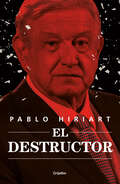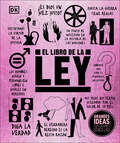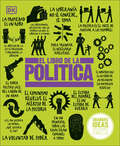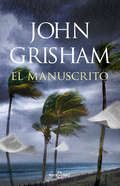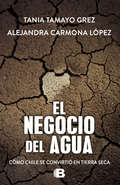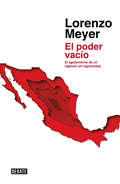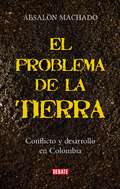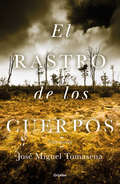- Table View
- List View
El desafío constitucional
by Carlos Peña«Es necesario crear un ámbito de racionalidad y de diálogo que, si bien no zanja del todo las diferencias, sí permite que se las pueda sobrellevar haciendo posible la cooperación.» En este breve ensayo, Carlos Peña busca explicar los temas y problemas más relevantes a la hora de pensar en una nueva constitución, uno de los desafíos nacionales clave que la clase política y la ciudadanía deberán resolver en el tiempo que viene. La importancia de los derechos sociales, la relevancia de la paridad de género, el reconocimiento a los pueblos originarios y la libertad de expresión son las cuestiones que el autor aborda de cara al gran desafío cívico que, luego de los acontecimientos de octubre de 2019, el país tiene como imperativo resolver. Al analizarlas clara y concisamente, Peña ofrece al lector antecedentes y orientaciones que le ayudarán a enfrentar la cuestión constitucional con racionalidad y sentido democrático.
El desierto
by Carlos Franz1993. Veinte años después de haber sido destituida como jueza, Laura Larco regresa de su exilio en Berlín a Pampa Hundida, pueblo detenido en el tiempo en el norte de Chile, a enfrentar los fantasmas de los años posteriores al golpe de Estado, y así responderle a su hija adolescente, sobre su participación durante los años de la represión.Simultáneamente, ha regresado también el mayor Cáceres, quien fuera el encargado de los campos de prisioneros, juicios militares, ejecuciones y desapariciones. Con la celebración de la Diablada como música de fondo, en este reencuentro se revelará un oscuro pasado en el que se conjugan el débil rol de la justicia, el poder del mal y la responsabilidad ética de la sociedad.
El destructor
by Pablo HiriartSÍ PODÍA SABERSESípodía saberse lo que iba a ocurrir si Andrés Manuel LópezObrador llegabaa la Presidencia. Bastaba observar,poner atención, seguir los pasos que fue dando desde sus orígenes como soldado priista. Eso es justamente lo que ha hecho Pablo Hiriart desde hace 34 años: señalar y documentar cada una de las afrentas que la democracia mexicana ha soportado a manos del fundador de Morena.Sí podía saberse que el único requisito para lucrar bajo el cobijo de AMLO era serle fiel. Así ocurrió cuando gobernó la Ciudadde México. Sí podía saberse que las instituciones serían despreciadas: lo habíaanunciado.Sí podía saberse que la corrupción inundaría su mandato: había precedentes, videos, documentos, una cauda de impunidades…Esta obra compila esa historia. Y, mediante una serie de diálogos de primer nivel, el autor demuestra algoaúnmás grave: a la vista de lo que ha hecho López Obrador, no hay razones para esperar que respete un resultado adverso en 2024.Sí puede saberse. Sí puede hacerse algo.
El dolor de los inocentes
by Julio Scherer IbarraEste sólido análisis jurídico-político de la guerra del presidente Calderón contra el narcotráfico (muchos de ellos víctimas inocentes), tiene el propósito de acreditarle responsabilidades legales que eventualmente posibilitarían un juicio en su contra. ¿Quién paga por los inocentes? ¿Quién reivindica su muerte? Cincuenta mil muertos, diez mil desaparecidos. Muchos de ellos eran inocentes. Mexicanos y extranjeros que pasaban por ahí, que estaban en el lugar equivocado, que trataban de llevar su vida en paz, que se hallaron entre el fuego cruzado, que cayeron víctimas de ataques, operativos o levantones. En el marco de la guerra emprendida por el gobierno del presidente Felipe Calderón, las autoridades han hablado en innumerables ocasiones de "daños colaterales", pero nunca han afrontado la pregunta más urgente: ¿quién debe responder por las muertes de esos inocentes? En este esclarecedor análisis, Julio Scherer Ibarra aborda los fundamentos jurídicos y políticos del Estado como garante de la seguridad y el orden para establecer hasta dónde han fallado las directivas del combate al narcotráfico. Al optar por un enfrentamiento bélico, más allá de las atribuciones reales que la Constitución le brinda al Ejecutivo federal, y en detrimento de otras posibles soluciones como la suspensión de garantías en ciertas partes del territorio nacional, la violencia se exacerbó y terminó con las vidas de miles de inocentes. ¿Habrá manera de llamar a cuentas a aquellos que han engendrado tanto dolor? En busca de respuestas, el autor desmenuza las leyes nacionales e internacionales que nos rigen, con el propósito de establecer cuáles responsabilidades políticas, penales, administrativas y civiles pueden fincarse por la aciaga decisión unilateral de haber sacado al ejército de los cuarteles para enfrentar a la delincuencia organizada.
El estafador
by John Grisham¿Quién es el estafador? Y ¿qué tiene que ver con el asesinato de un juez? Su nombre, de momento, es Malcolm Bannister.¿Profesión? Fue abogado.¿Lugar de residencia actual? Centro Penitenciario Federal de Frostburg, Maryland.Sobre el papel, la situación de Malcolm no pinta nada bien; pero guarda un as en la manga: sabe quién asesinó al juez Fawcett y también sabe por qué.El cadáver del juez fue hallado en su cabaña a la orilla de un lago. La entrada no había sido forzada. Lo único que encontraron fueron dos cuerpos sin vida: el del juez y el de su joven secretaria. Y otra cosa: una caja fuerte grande, el modelo más moderno y más seguro, abierta y vacía.Y ¿qué había en la caja fuerte? Al FBI le encantaría saberlo, y a Malcolm Bannister, contarlo. Pero todo tiene su precio, sobre todo una información tan valiosa como esta, y el estafador no tiene un pelo de tonto.
El fango: Cuarenta años de corrupción en España
by Baltasar GarzónJuan Guerra, Bárcenas, Pujol, caso Noos... un recorrido por los casos de corrupción más importantes de los últimos cuarenta años para extraer las lecciones de cómo combatir y prevenir la corrupción. El fango es por tanto un libro necesarioLa corrupción es un mal que ha socavado los cimientos de la democracia española. Aunque los escándalos han emergido en momentos de crisis económica como los primeros 90 y desde el 2009, se puede trazar una línea continua que desde las postrimerías del franquismo muestra cómo las fallas del sistema del control facilita y en ocasiones propicia un aprovechamiento ilícito y muy lucrativo.La experiencia de Baltasar Garzón en la lucha contra la corrupción la ha permitido trazar este recorrido que arranca con el caso Matesa y termina en la actualidad y cubre todos los niveles administrativos, todas las regiones y todos los sectores económicos. Para prevenir la corrupción es fundamental entender cómo se origina y cómo funciona, sus mecanismos ocultos de la corrupción, por qué es tan difícil combatirla y qué reformas son necesarias para ponerle fin.
El fiscal imperial: El eslabón más oscuro de la 4T
by J. Jesús LemusDurante los primeros tres años de gobierno de la llamada Cuarta Transformación, no se ha logrado revertir la tendencia al alza de los índices de impunidad. Como justificante de ello, oficialmente se acusa a la inercia del estado de descomposición social heredado de las dos anteriores administraciones federales, manifiesto principalmente en actos de corrupción del Poder Judicial Federal, sin poner atención y sin señalar siquiera la escasa actuación de la Procuraduría General de la República (PGR) convertida ahora en Fiscalía, que es el primer órgano procurador de justicia.Solo entre el 2018 al 2021, los índices de impunidad registrados en México han colocado a nuestro país en los primeros cinco de los 100 que registran una mayor deficiencia en la persecución de delitos en todo el orbe. Este es el tema de este libro: desentrañar las razones por las que hoy la Fiscalía General de la República (FGR) y su titular Alejandro Gertz Manero, continúan con la tendencia de impunidad marcada desde el pasado.¿Cuáles son los motivos del fiscal Gertz Manero para continuar con la política de impunidad marcada desde hace tres administraciones priistas y dos panistas? ¿De qué tamaño son los compromisos que impiden al Fiscal desempeñar sus funciones? ¿Es falta de capacidad o exceso de compromisos lo que hacen de Gertz uno de los funcionarios más grises de la Cuarta Transformación? ¿Por qué el presidente Andrés Manuel López Obrador se empeña en protegerlo? ¿Por qué el Fiscal es prácticamente inexistente? ¿Quién es en realidad Alejandro Gertz Manero? Esas son las principales preguntas a las que este libro busca dar respuesta.The Non-existent ProsecutorDuring the first three years of the government of the so-called Fourth Transformation, it has not been possible to reverse the upward trend in impunity rates. As justification for this, the inertia of the state of social decomposition inherited from the two previous federal administrations is officially blamed, manifested mainly in acts of corruption in the Federal Judiciary, without paying attention and without even pointing out the poor performance of the Attorney General's Office (PGR) now converted into the Prosecutor's Office, which is the first prosecutorial body of justice.Only between 2018 to 2021, the impunity rates recorded in Mexico have placed our country in the top five of the 100 that register a greater deficiency in the prosecution of crimes throughout the orb. This is the subject of this book: to unravel the reasons why today the Attorney General's Office (FGR) and its head, Alejandro Gertz Manero, continue with the trend of impunity set in the past.What are the motives of Prosecutor Gertz Manero to continue with the policy of impunity marked for three PRI and two PAN administrations? How big are the commitments that prevent the Prosecutor from performing his duties? Is it lack of capacity or excess of commitments that make Gertz one of the grayer officials of the Fourth Transformation? Why does President Andrés Manuel López Obrador insist on protecting him? Why is the Prosecutor practically non-existent? Who is actually Alejandro Gertz Manero? These are the main questions that this book seeks to answer.
El gran derrame
by Kenneth Eade Ana Claudia MacorettaNuestra madre Tierra necesita ayuda, pero ¿a qué precio? Vive la intriga y el misterio de este súper ventas de la colección de intriga jurídica del galardonado escritor a quien la crítica aclama como «uno de los más importantes autores contemporáneos de suspense». Tras un catastrófico derrame de petróleo que amenaza las costas de Santa Bárbara, la novia del abogado Brent Marks inicia acciones legales contra las petroleras. Las victorias iniciales obtenidas en la demanda colectiva dan paso a una declaración abierta de guerra contra el uso de combustibles fósiles. Cuando ella desaparece, se sospecha que ha sido obra de una trama oculta y Brent se debate entre proseguir o desistir del caso.
El hombre moderno
by Esther Martínez Saiz Cristiane SerruyaLa autora examina el estado del hombre moderno, sus pensamientos, sentimientos y su vida en un estilo directo, poético y sensible. Un texto contemporáneo que abarca la angustia y deseos humanos, sus necesidades y proyectos, sus sueños y utopías, que lleva al lector a pensar dos veces en sus actos cotidianos. Prólogo de Carla Francalanci, Doctora por la Boston University
El infierno tan temido: El secuestro en México
by Saskia Niño de Rivera Manuel López San MartínTestimonios de sobrevivientes y secuestradores. El secuestro en México es un delito que ha revolucionado y crecido de forma voraz: lo mismo destroza la vida de personas millonarias que de hombres y mujeres con escasos recursos. El libro ofrece una contraparte no menos amarga con la voz de las víctimas para develar cómo fue su día a día durante el secuestro, qué secuelas físicas y mentales quedaron en su vida, cómo fue la relación con sus captores y cómo reaccionaron ante las torturas y violaciones, entre muchas otras confesiones estremecedoras. El infierno tan temido: El secuestro en México es un documento único que devela la entraña del delito, no para juzgar desde lo inmediato, sino para reflexionar sobre qué podemos hacer para decir basta a la violencia que destroza a México.
El juicio
by Robert WhitlowUn abogado listo para morir acepta su último caso... el juicio de su vida.El abogado Kent Mac McClain ya no tiene motivos para vivir. Nueve años después del terrible accidente que se cobró la vida de su esposa y sus dos hijos, finalmente se da por vencido. Su casa vacía es un espejo de su alma vacía. Parecería que el suicidio es la única salida. Pero suena el teléfono.Angela Hightower, una hermosa heredera, hija del hombre más poderoso de Dennison Springs, fue hallada muerta al pie de un barranco. Peter Thomason, acusado del asesinato, necesita un abogado. Pero Mac ya se enfrentó alguna vez a los Hightower y a sus poderosos y despiadados abogados, y ese encuentro lo dejó con su reputación y su estudio pendiendo de un hilo.Las pruebas que señalan la culpabilidad de Thomason parecen incontestables. ¿El cliente de Mac es un ingenioso psicópata, o alguien ?posiblemente un familiar de la propia víctima? le tendió una trampa a Thomason? Todo se reduce a un último juicio. Thomason se enfrenta a la silla eléctrica; Mac, a su propio pasado tormentoso: un adversario que demostrará ser igual de mortífero.
El juicio: Crónica de la caída del Chapo
by J. Jesús EsquivelNarrado con toda crudeza por sus protagonistas, El juicio exhibe la degradante historia de México durante los últimos años, presa absoluta del crimen organizado y la corrupción gubernamental. J. Jesús Esquivel -uno de los periodistas mexicanos que mejor conocen el mundo del narco y el único que ha documentado esta realidad tal y como la enfocan las autoridades norteamericanas- entrega con este libro la más original de las crónicas sobre el proceso judicial que el gobierno de Estados Unidos ejecutó en contra de Joaquín El Chapo Guzmán. No sólo se trata de una descripción completa, fiel y crítica del proceso que muchos han llamado "el juicio del siglo", sino que recurriendo a distintas herramientas periodísticas y narrativas -incluyendo una entrevista exclusiva a Emma Coronel, esposa de Guzmán Loera- el autor ha montado un auténtico thriller legal, al estilo de Scott Turow o John Grisham. Pero la riqueza de contenido del libro trasciende los registros anecdóticos, el desfile de testigos, peritos y policías, así como las evidencias presentadas en contra del inculpado y el exhibicionismo criminal que se dio en la Corte Federal del Distrito Este, en Brooklyn, Nueva York. Lo que también leemos en estas páginas es la hipocresía del sistema penal estadounidense y la perversión de la guerra contra las drogas.
El juicio: Crónica de la caída del Chapo
by J. Jesús EsquivelNarrado con toda crudeza por sus protagonistas, El juicio exhibe la degradante historia de México durante los últimos años, presa absoluta del crimen organizado y la corrupción gubernamental. J. Jesús Esquivel -uno de los periodistas mexicanos que mejor conocen el mundo del narco y el único que ha documentado esta realidad tal y como la enfocan las autoridades norteamericanas- entrega con este libro la más original de las crónicas sobre el proceso judicial que el gobierno de Estados Unidos ejecutó en contra de Joaquín El Chapo Guzmán. No sólo se trata de una descripción completa, fiel y crítica del proceso que muchos han llamado "el juicio del siglo", sino que recurriendo a distintas herramientas periodísticas y narrativas -incluyendo una entrevista exclusiva a Emma Coronel, esposa de Guzmán Loera- el autor ha montado un auténtico thriller legal, al estilo de Scott Turow o John Grisham. Pero la riqueza de contenido del libro trasciende los registros anecdóticos, el desfile de testigos, peritos y policías, así como las evidencias presentadas en contra del inculpado y el exhibicionismo criminal que se dio en la Corte Federal del Distrito Este, en Brooklyn, Nueva York. Lo que también leemos en estas páginas es la hipocresía del sistema penal estadounidense y la perversión de la guerra contra las drogas.
El libro de la ley (DK Big Ideas)
by DKGrandes ideas, explicaciones sencillasUna completa introducción al mundo jurídico con explicaciones claras y concisas que presenta de forma accesible las nociones básicas del Derecho y las principales leyes y acontecimientos jurídicos que han marcado la historia e influenciado el cambio social. Ideal para obtener una visión general de los fundamentos del sistema legal que rige la sociedad.¿Cuándo se promulgaron los primeros códigos legales? ¿Para qué sirven las leyes? ¿Quién fue Ulpiano? ¿Dónde y por qué surgió la Carta Magna? Escrito en un lenguaje sencillo y comprensible para no juristas y con la ayuda de diagramas, líneas temporales, cuadros sinópticos e ingeniosas ilustraciones que descifran conceptos jurídicos complejos, El libro de la ley explora las leyes, sentencias judiciales y personajes clave de la historia legal, así como los códigos religiosos y morales que han forjado el mundo en que vivimos.Un libro de consulta imprescindible para jóvenes y adultos, estudiantes, juristas o legos en la materia, y cualquier persona que desee entender el ordenamiento jurídico, los derechos y deberes que emanan de él y aumentar su comprensión sobre la sociedad. La ley explicada de forma sencillaEl Derecho se remonta a las primeras civilizaciones y, como realidad social, es inseparable de nuestra vida cotidiana. El conocimiento de la ley y los instrumentos legales resulta imprescindible para entender no solo la realidad social, política y económica de nuestros días, sino también la historia y la civilización. Descubre las primeras leyes, como el Código de Hammurabi, el proceso hacia la abolición de la esclavitud o los movimientos que impulsaron la reforma laboral, la legalización de los sindicatos, el sufragio universal o los Convenios de Ginebra.Este libro de historia del Derecho ofrece un fascinante recorrido por los orígenes, evolución y consolidación del Derecho, desde sus primeras manifestaciones en forma de usos y costumbres al establecimiento de los primeros códigos, órganos jurisdiccionales y organismos internacionales que regulan la sociedad moderna con nuevas leyes como los derechos de autor, el matrimonio entre personas del mismo sexo o el "derecho al olvido". El libro de la ley nos enseña la evolución del Derecho a lo largo de los siglos, desde el código de Ur-Nammu, hace más de 4000 años, a los derechos digitales en la época actual: - Los inicios del Derecho: 2100 a.C - 500 a.C. - En Derecho en la Edad Media: 500-1470 - Imperio e Ilustración: 1470-1800 - El imperio de la ley: 1800-1945 - Un nuevo orden internacional: 1945-1980 - El Derecho en el mundo actual: A partir de 1980
El libro de la política (DK Big Ideas)
by DKGrandes ideas, explicaciones sencillasCon un lenguaje claro, El libro de la política ofrece concisas explicaciones que desbrozan la jerga académica, esquemas que hacen sencillas las teorías más complejas e ingeniosas ilustraciones que juegan con nuestra comprensión de la política.¿Debe ser derrocado un gobernante injusto? ¿Es la democracia la mejor forma de gobierno? ¿Puede ser justa una guerra? A lo largo de la historia, estas y otras preguntas acerca de cuál es el mejor modo de gobernarnos han suscitado respuestas de grandes pensadores que hoy siguen dando forma al mundo.La política explicada de forma sencilla¿Crees que la política exisitiría si todos pudie´ramos tener lo que queremos cuando lo queremos? Sea cual fuere el significado exacto de esa actividad compleja llamada poli´tica -y, como expone este libro, se ha entendido de muchas formas distintas-, esta´ claro que la experiencia humana nunca nos da todo lo que queremos.Hemos de competir, esforzarnos, pactar y, a veces, luchar por ello. Al hacerlo creamos un lenguaje para explicar y justificar nuestras demandas y para retar, contradecir o responder a las demandas de los dema´s. Este lenguaje podri´a ser, o bien un lenguaje de intereses, ya sean individuales o grupales, o bien de valores, como en el caso de los derechos y las libertades o de la igualdad y la justicia. Pero, desde sus inicios, lo primordial de la actividad poli´tica es la creacio´n de ideas y conceptos poli´ticos que nos ayuden a exigir y defender nuestros intereses.La defensa de intereses ha mutado a lo largo de los años y así lo ha hecho la ciencia de la política. Tanto el neófito como el estudiante o el experto aficionado encontrarán en este libro de política en español numerosos contenidos de su interés a través de los siguientes capítulos: • El pensamiento político en la antigüedad. 800 A.C.-30 D.C. • Política medieval. 30-515. • Racionalismo e ilustración. 1515-1770. • Ideas revolucionarias. 1770-1848. • La rebelión de las masas. 1848-1910. • Choque de ideologías. 1910-1945. • La política de posguerra. 1945-presente.El libro de la política, pertenece a la galardonada serie Grandes Ideas explica temas complejos de un modo fácil de entender mediante explicaciones claras y alejándose del academicismo tradicional. Su creativo diseño y los gráficos innovadores que acompañan al texto hacen de esta serie una introducción perfecta a una gran diversidad de materias para toda la familia.
El libro del crimen (DK Big Ideas)
by DKGrandes ideas, explicaciones sencillasTan documentado como cautivador, con un texto absorbente y sugerentes ilustraciones, El libro del crimen aporta una nueva perspectiva sobre el crimen y la criminología. Desde los piratas y los salteadores hasta los asesinos en serie y los ciberdelincuentes del siglo XXI, cada artículo ofrece un vislumbre sobre la mente criminal y el sistema judicial.¿Cómo se ganó Jack el Destripador su siniestro nombre? ¿Quién «vendió» la Torre Eiffel? ¿Cómo llevaron a cabo el atraco los ladrones del Hatton Garden? Este libro responde estas y otras muchas preguntas mediante el análisis de las estafas, los robos y los asesinatos más infames de la historia.¡La criminología explicada de forma sencilla!Los crímenes (delitos graves castigados por la ley y que pueden ser juzgados) son el pan de cada día, desde infracciones menores relativamente triviales hasta actos atroces de increíble maldad.Los autores de tal variedad de delitos han fascinado largamente a los estudiosos, así como al público en general. Averigua si ciertas personas tienen una mayor tendencia que otras a cometer crímenes o si existen unos rasgos del carácter exclusivos de los criminales, como se decía en la antigua Grecia, quienes creían que ciertos rasgos faciales o la naturaleza de una persona eran indicadores de riesgo.Tanto el estudiante de derecho o psicología como el ávido lector de novela criminal encontrarán en este libro en español para adultos, jóvenes y niños, multitud de casos de crímenes perfectos y crímenes imperfectos, en ocasiones tan interesantes como sobrecogedores a través de los siguientes capítulos: • Bandidos, ladrones, y pirómanos. • Estafadores. • Crímenes de guante blanco. • Crimen organizado. • Secuestro y extorsión. • Asesinatos. • Asesinos seriales. • Intrigas y asesinatos políticos.El libro del crimen, pertenece a la galardonada serie Grandes Ideas que, en su versión de libros en español, explica temas complejos de un modo fácil de entender mediante explicaciones claras y alejándose del academicismo tradicional. Su creativo diseño y los gráficos innovadores que acompañan al texto hacen de esta serie una introducción perfecta a una gran diversidad de materias para toda la familia.
El licenciado: García Luna, Calderón y el narco
by J. Jesús LemusEn esta investigación se ahonda en las relaciones que mantuvo durante dos sexenios el encargado de la inteligencia del Estado mexicano y de la seguridad pública del país, y que alcanzaron el grado de fraternidad con los principales capos de las drogas, los que en teoría, eran sus objetivos de captura. Tras una minuciosa revisión documental y testimonial, de expedientes criminales y de actores del narcotráfico, en este trabajo periodístico se expone cómo Genaro García Luna fue el más fuerte aliado del principal jefe del narcotráfico, Joaquín Guzmán Loera, contribuyendo en gran medida al fortalecimiento y crecimiento del Cártel de Sinaloa, una de las organizaciones criminales más poderosas del mundo. La investigación se refuerza con expedientes judiciales, averiguaciones y sentencias, declaraciones de sentenciados, acusados y testigos, así como estudios psicológicos practicados en las cárceles. Aquí se señalan los principales colaboradores de García Luna, y cómo operaron en el entramado criminal y político no solo para permitir la libre operación de los grupos del narcotráfico, sino para maquillar la realidad nacional en una aparente lucha contra la delincuencia, haciendo de la justicia una verdadera farsa mediática, como en los casos de “El Michoacanazo”, “Operación Limpieza”, “La Banda de Los Zodiacos”, “Caso Florence Cassez” y otros episodios vergonzosos de la guerra del narcotráfico en México.
El manuscrito
by John GrishamBienvenidos a Camino Island, donde todo puede pasar... incluso un asesinato durante un huracán que podría convertirse en el crimen perfecto. NADIE LO CUENTA COMO GRISHAM. Cuando el huracán Leo se desvía de su curso previsto para dirigirse hacia Camino Island, en la costa de Florida, la mayoría de sus habitantes decide abandonar la isla. Solo un pequeño grupo de irreductibles elige quedarse, entre ellos Bruce Cable, el propietario de la librería Bay Books. El huracán avanza destrozándolo todo y dejando casas derrumbadas, hoteles y tiendas destruidos, calles inundadas y una docena de muertos. Uno de los fallecidos es Nelson Kerr, amigo de Bruce y autor de thrillers. Pero los indicios sugieren que la tormenta no fue la causa de la muerte de Nelson: la víctima recibió numerosos golpes sospechosos en la cabeza. ¿Quién querría matar a Nelson? La policía local está sobrepasada por los efectos del huracán y no se encuentra en condiciones de ocuparse del caso. Pero Bruce comienza a preguntarse si algunos oscuros personajes de las novelas de su amigo podrían ser más reales que ficticios. Y en algún lugar del ordenador de Nelson está el manuscrito de su nueva novela. ¿Estará allí, en negro sobre blanco, la clave del caso? Bruce empieza a investigar y lo que descubre entre sus páginas es más impactante que cualquiera de los giros de las tramas de Nelson... y mucho más peligroso. La crítica ha dicho...«Otra joya de John Grisham.»Observer «El mejor autor vivo de thriller.»Ken Follett «El manuscrito tiene el habitual sello distintivo de Grisham: una trama trepidante y escenas llenas de tensión.»Independent «La perfecta mezcla escapista de acción detectivesca, entresijos del mundo literario... e incluso un poco de romance.»Mail on Sunday «Entretenimiento de evasión [...] con elementos de los thrillers más tradicionales de Grisham.»The New York Times «Una novela de intriga que juega al gato y al ratón. Grisham es un escritor irresistible. Su prosa es fluida y fantástica.»Pittsburgh Post-Gazette
El negocio de los derechos humanos: Humildes estafados, progres engañados, trampas y corrupción: Los verdaderos sueñ
by Luis GasullaLa polémica investigación que revela el modo en que los Derechos Humanos pasaron del idealismo impoluto al barro de la corrupción y los negociados. Flujo desbocado de fondos públicos, tráfico de influencias y tergiversaciones simbólicas e ideológicas: de eso está hecha la alianza entre el poder y los Derechos Humanos en la Argentina K. No queda del todo claro cómo fue que el líder de una administración que jamás recibió a estos organismos durante años y años de intendencias y gobernaciones patagónicas, terminó embanderado como caudillo en la defensa de los Derechos Humanos. Luis Gasulla señala que la matriz de eso que se conoce como «El relato» está allí mismo: en una bandera que pasó a ser fundamento de la hegemonía política de los Kirchner. Solo que junto al dinero derivado hacia Madres de Plaza de Mayo, empezaron a reproducirse también los escándalos. Sergio Schoklender, uno de los protagonistas de este libro, no hubiese podido transformarse en lo que llegó a ser sin la complicidad de un sistema conformado por los Poderes Ejecutivo, Legislativo y Judicial, que decidieron mirar hacia otro lado. Se archivaron denuncias, se silenciaron protestas y se continuaron subsidiando obras sin importar cómo se usaba el dinero. El discurso del «juicio y castigo» y la reescritura del pasado parecían servir para tapar cualquier desaguisado, pero la ruptura escandalosa entre Hebe de Bonafini y Sergio Schoklender indica que no es así. Y que las manchas en el pañuelo más significativo de la historia nacional solo pueden multiplicarse.
El negocio del agua: Cómo Chile se convirtió en tierra seca
by Tania Tamayo GrezUn libro de investigación periodística imprescindible y contingente con miras a la Conferencia de la ONU sobre el Cambio Climático Chile se seca a velocidad vertiginosa. Pero se trata de una sequía selectiva. En Petorca, región de Valparaíso, miles de personas racionan su consumo diario, mientras extensas plantaciones de paltos demandan miles de litros para alimentar el negocio del «oro verde». En esta investigación de tres años, las autoras indagan en este escenario de escasez desde su aparatoso origen en una ley amarrada por la dictadura cívico-militar, que convirtió a Chile en el único país donde el agua es un «bien de mercado», y profundizan en cómo estos privilegios son hasta hoy celosamente defendidos por los poderosos.
El pacto Menen- Kirchner: Suiza y los secretos del dinero negro de la política y los negocios
by Juan GaspariniEl pacto suizo de no agresión entre Carlos Saúl Menem y Néstor Kirchnerflorece en este libro impecablemente documentado, en el que se revela lamatriz helvética de las coimas y una red de corrupción internacional. ¿En qué se parecen escándalos como los de Thales, Skanska, Siemens,Alstom y el tren bala, la cuenta suiza de Menem, el Valijagate o losfondos de Santa Cruz? ¿Existe un patrón de comportamiento entreempresas, actores políticos y del ámbito judicial? ¿Son, todos ellos,piezas de un sistema coercitivo que hacen a la impunidad argentina enestos veinticinco años de democracia?Más allá de mutuas críticas ideológicas y de supuestos odios políticos,ambos ex presidentes han decidido, al menos con los dineros suizos, nopasar a mayores, evitar la confrontación.Por encima de convenciones internacionales, de reglamentos y de órganosde control, las firmas trasnacionales no han abandonado la estrategia desobornar para competir en los mercados. Esta investigación periodísticamuestra cómo funcionan, dentro y fuera del país, las grandes coimas, ydesnuda un hecho que, aun estando al alcance de la mano, la justiciaprefiere ignorar: la red de la corrupción internacional y suscomplicidades vernáculas no solo no se ha alterado, sino que se hanfortalecido en las últimas décadas.
El poder corrompe
by Gabriel ZaidLa corrupción no fue una característica lamentable del llamado Sistema Político Mexicano: fue el Sistema Político Mexicano. La corrupción de los poderes públicos es una tradición universal y milenaria. En México, tuvo un papel histórico: apaciguar a los caudillos insurgentes del siglo XIX y revolucionarios del XX, entronizando al presidente como Supremo Dador. La corrupción no fue una característica lamentable del llamado Sistema Político Mexicano: fue el Sistema Político Mexicano. A pesar de lo cual, circulan explicaciones rudimentarias. Por ejemplo: que la corrupción está en los usos y costumbres del país como expresión de los genes de los mexicanos. Este libro pretende superar el fatalismo, la moralina y el cinismo de tales explicaciones. Y acompaña el análisis con propuestas concretas. De Gabriel Zaid hemos publicado casi todos sus libros, y en relación con éste La economía presidencial.
El poder vacío: El agotamiento de un régimen sin legitimidad
by Lorenzo Meyer«Tras el agotamiento del priismo, México está embarcado en una gran aventura: escribir un nuevo capítulo de su historia.» El poder vacío no escatima ideas para exprimir (en el sentido barroco de «explicar») la naturaleza de la política, su crítica y la estructura social en nuestro país, lo que constituye el bagaje para analizar, por momentos acaso sin piedad, los lastres de un PRI muy venido a menos, como la violencia, la corrupción y la violación de los derechos humanos, así como las realidades que no previó ni como partido ni como gobierno: las elecciones de 2018, la enseña lopezobradorista y, finalmente, el inimaginado cambio que, cuando despertó, ya estaba ahí. Con hechos descritos puntualmente, con cifras documentadas, con la luz de fundadas teorías políticas y no con un adarme de citas, sino con una razonada exposición de ellas, este libro da cuenta de la decadencia de un sistema que incluso en el año 2000, con la engañosa alternancia, parecía imbatible.
El problema de la tierra: Conflicto y desarrollo en Colombia
by Absalón MachadoReflexión sobre una política integral de tierras más allá de la restitución a los desplazados y el acceso a ella a través del mercado. Por más de 25 años el problema de la tierra en Colombia estuvo archivado en bibliotecas o en los círculos de especialistas, pero en el marco de los acuerdos de paz alcanzados en La Habana y el advenimiento del posconflicto, el desarrollo rural colombiano está de vuelta en la agenda pública. Este libro examina las políticas que han orientado el desarrollo de la estructura agraria colombiana desde el siglo xix y la asignación de baldíos de la Nación. Muestra de qué manera esta estructura agraria, formada en dos siglos de historia republicana, ha sido un obstáculo para el desarrollo económico, social y político, por sus vínculos con el poder y la violencia. En su análisis, Machado revisa las reformas impulsadas durante el gobierno de Juan Manuel Santos y se pregunta por las posibilidades de la institucionalidad
El rastro de los cuerpos: Una novela
by José Miguel TomasenaCon maestría y un claro juego de espejos, José Miguel Tomasena hace un retrato de la impunidad y la violencia desde el punto de vista de las víctimas. Cuando el diario en el que trabajaba entra en crisis, la periodista Tania Vázquez decide filmar por su cuenta un documental sobre los desaparecidos. Así conoce, entre muchas personas, a Doña Gaby, cuya hija Marilyn fue secuestrada previo pago de un rescate de cien mil pesos, y a Magdalena Chávez, que perdió a sus tres hijos y que decide embarcarse en una aventura para conocer su paradero. Estas dos madres, más todos aquellos padres que buscan a sus seres queridos en morgues, cuarteles, hospitales y fosas clandestinas, serán los personajes que iremos construyendo a través de mirar las grabaciones y de la voz del novio de Tania; sin embargo, documentar la lucha de estas mujeres tendrá consecuencias que jamás habrían podido prever... Con maestría y un claro juego de espejos, José Miguel Tomasena hace un retrato de la impunidad y la violencia desde el punto de vista de las víctimas, sean residentes en las regiones asoladas por el narcotráfico que sufren de la persecución cotidiana, o los periodistas acosados por los caciques locales para que no investiguen sobre desapariciones que prefieren dejar en el olvido; pero también es una novela sobre el amor a los hijos, sobre la esperanza de poder hacer un cambio y los deseos de justicia. «¿Dónde están los desaparecidos?, se preguntan los que se quedan, los sobrevivientes, pero sobre todo se atormentan pensando qué pudieron haber hecho, en qué fallaron, si es que hubo alguna posibilidad de salvación, de que la historia fuera distinta. El rastro de los cuerpos es el relato descarnado de estas pérdidas, una exploración ética y moral sobre la culpa y la responsabilidad, sobre el sentido del heroísmo y su peligrosa vecindad con la temeridad. Una magnífica novela que ojalá algún día podamos leer como un thriller, como una estupenda novela policiaca o de suspenso, en un futuro de paz, cuando hayamos superado la epidemia de violencia que asola al país». Juan Pablo Villalobos, autor de Fiesta en la madriguera


